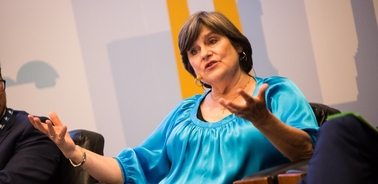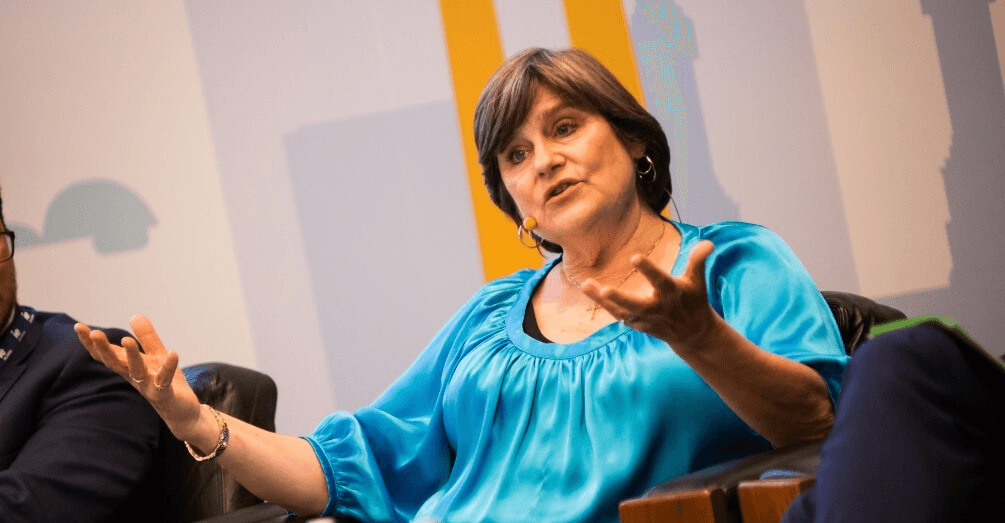- Home
- News And Events
- What’s Going On
- Faculty Spotlight: Gayle Allard
Faculty Spotlight: Gayle Allard

Meet one of IE Business School’s Leading Professors.
Gayle Allard has published research on labor markets, the welfare state, public-private partnerships and innovation in developing countries, especially in Africa. She developed indicators on labor-market rigidity and the generosity of unemployment benefits that continue to be used by researchers and institutions such as the IMF across many disciplines. And she speaks to the press and contributes to public debate on a wider range of issues that center on how policy can be used most effectively to address human problems. But Gayle, who was Vice-Provost for Research when IE University was created and has been Professor of Economic Environment at IE Business School since 2002, is perhaps best known as an IE institution in her own right. Not only has the California native invested decades of her career at IE Business School, but she regularly reaps accolades for her teaching and is one of the all-time favorites for the alumni community.
Get a closer look at one of IE Business School’s favorite professors:
What brought you to IE? Where were you before?
I do not have a conventional career. Though I did a couple of Master’s degrees in my 20s and was sure I wanted to go further academically, I also wanted to have a big family. Both now and then, it is difficult to do both. I was lucky and had two pairs of twins in a row –five babies in four years—so I did get the big family! But then I wanted to be able to enjoy them, to raise them, to spend my best hours each day with them. So I did. I became the original remote worker, I guess, continuing to work for great employers like The Economist or JP Morgan either part-time or from home, which in those days was a huge concession. I had to fight for the right to organize my time and raise my children, and I said “no” to my dream jobs at least twice-- but I have no regrets. I think the workplace has become a much more friendly place for women since my five were born.
I came to IE because I had finished my PhD in Economics at the University of California and my husband had a great job in Spain, so I needed to find something there. I really did not know IE well, but I knew that for an academic living in Madrid, it was my best option. I was lucky, because as IE evolved it took on features that I find very attractive: it became supremely diverse and international, valued a practical approach to education, developed a commitment to social issues, and above all offered the privilege of educating young adults from everywhere who have such varied and fascinating experiences in life. It was the right place for me. I did decide early on at IE that I did not want administrative responsibilities: my first loves are teaching and research. That, and the students, have made me very happy.
Have you ever had an a-ha moment while teaching that furthered your research? What was it?
I have a-ha moments in the classroom all the time. I suppose the most recent ones have been regarding Africa, where I have centered much of my research in the past decade. But often students will ask deeper questions, like why do we always need to grow? What would an economic world that was more environmentally friendly look like? This can get you moving down a new path mentally. Exploring ideas and contrasting viewpoints is often the best way to open new doors in your mind.
What book do you wish your students would read before taking your class and why?
Two new interesting books are The Economics of Belonging by Martin Sandbu and Mission Economy by Mariana Mazzucatto. But, the most important reading habit I’d love for them to develop is to follow economic developments-- which are so fast-changing that books are quickly outdated—in The Economist or The Financial Times. Solid, rigorous, impartial, lots of perspective.
Please tell us what part of your work is the source of your greatest pride—and that addresses the current issues of 2021?
I have been grateful to receive many teaching awards at IE, to have had so many effusive comments from students who remember me afterwards, and to have publications in top journals on issues I care deeply about (economic development, social equality). But my deepest satisfactions in life have not come from my career. I am proudest of my five children, all intelligent, ethical and deep-thinking people who have found their passions in many different fields. And I am deeply satisfied by the work I have done in Ethiopia over the past decade. I work with a social entrepreneur to provide water to a community in southern Ethiopia where the water shortage is hard to even comprehend. I founded an NGO, Wuha Sira, to support the project (it has all former IE students on the board and receives an annual, deeply appreciated grant from IE Foundation), and it has funded his efforts and provided a way for IE students to guide and refine his business model, all while bringing clean and safe water to hundreds of families.
Tell us one personal thing about yourself that none of your students know. A hobby, sport or talent? Strange fact? Unusual interest?
Interests? I adore traveling-- so much world to see and learn from! Nature hypnotizes me and we retreat to places in the woods or by the sea whenever we can. I love horseback riding, reading, cooking, being with my family and my two little grandsons, talking to anyone and everyone about the economy, trying to understand the world and figure out how to make it a little better.
